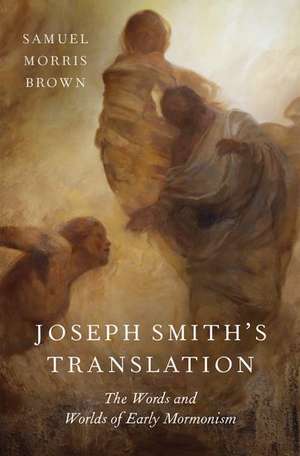Joseph Smith's Translation: The Words and Worlds of Early Mormonism
Autor Samuel Morris Brownen Limba Engleză Hardback – 17 iul 2020
Preț: 222.01 lei
Nou
Puncte Express: 333
Preț estimativ în valută:
42.49€ • 44.30$ • 35.31£
42.49€ • 44.30$ • 35.31£
Carte disponibilă
Livrare economică 17-22 februarie
Preluare comenzi: 021 569.72.76
Specificații
ISBN-13: 9780190054236
ISBN-10: 0190054239
Pagini: 320
Dimensiuni: 236 x 163 x 33 mm
Greutate: 0.54 kg
Editura: Oxford University Press
Colecția OUP USA
Locul publicării:New York, United States
ISBN-10: 0190054239
Pagini: 320
Dimensiuni: 236 x 163 x 33 mm
Greutate: 0.54 kg
Editura: Oxford University Press
Colecția OUP USA
Locul publicării:New York, United States
Recenzii
Brown's goal lies in finding just the right concept combination to bring today's reader into some sort of understanding of Smith's situation, and he does with "primordial" elements, a notion centripetally attracting such themes as sacred-secrecy, wisdom traditions, priesthoods, and most especially family bonding. Brown's affinity with primordial dynamics generates this book's extended account of how he sees them developing within Josephâs personal spirituality and community leadership all, again, framed by Smith family ties, evolving capacities for death conquest, religious protest, and ever ongoing cosmic possibilities.
...its approach is thought-provoking and creative, and parts of it can break new ground in understanding the work of Joseph Smith.
I found Joseph Smith's Translation stimulating. Brown weaves his way through the wide variety of the texts Smith produced to identify common threads of metaphysical transformation and communal ascent. For those with an esoteric bent, he provides satisfying ways of understanding Joseph Smith's scriptural contributions. Samuel Morris Brown has "translated" Joseph Smith for the reader in a way we have not seen before.
...its approach is thought-provoking and creative, and parts of it can break new ground in understanding the work of Joseph Smith.
I found Joseph Smith's Translation stimulating. Brown weaves his way through the wide variety of the texts Smith produced to identify common threads of metaphysical transformation and communal ascent. For those with an esoteric bent, he provides satisfying ways of understanding Joseph Smith's scriptural contributions. Samuel Morris Brown has "translated" Joseph Smith for the reader in a way we have not seen before.
Notă biografică
Samuel Morris Brown - intensive care unit physician, medical researcher, and cultural historian-is Associate Professor of Pulmonary and Critical Care Medicine and Medical Ethics and Humanities at University of Utah/Intermountain Medical Center and director of the Center for Humanizing Critical Care at Intermountain. The author of In Heaven as It Is on Earth and Through the Valley of Shadows, Dr. Brown researches and writes at the interfaces among medicine, religion, culture, and history.
